Scale, space, and subjecthood: Methods for understanding plantations as ecological form and enduring logic
Sophie Chao01/31/2024 | Projects
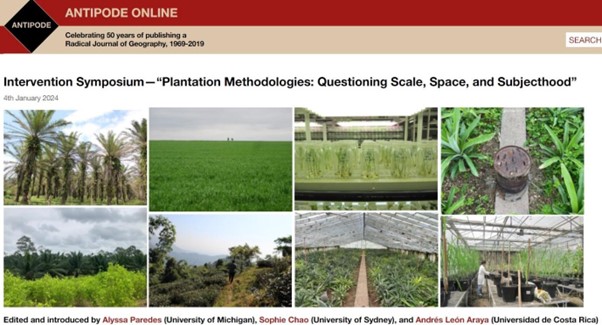
The Antipode Intervention, “Plantation Methodologies: Questioning Scale, Space, and Subjecthood,” [Image source: https://antipodeonline.org/2024/01/04/plantation-methodologies/]
Grappling with methods
Large-scale plantations are emblematic of an era in which industrial activities are reconfiguring landscapes at a planetary scale, or what some scholars have coined as the “Plantationocene.” Within these vast, privatized, and monocultured spaces, visions of out-and-out exterminism and regimented homogeneity work hand in hand with dreams of endless growth and profit. In both respects, plantations are tethered to longer histories of colonial expansion, capitalist modernities, land appropriation, corporate occupation, exploitative labor, and entrenched nature-culture divides that together legitimate the unsustainable extraction of natural resources and the subjection of marginalized humans to racialized hierarchies of worth.
Recent years have seen an unprecedented surge in interdisciplinary attention to plantations’ unevenly distributed forms and effects. Such debates have foregrounded how plantations emerge within asymetric power fields, wherein science, technology, culture, and economy intersect to produce beneficial outcomes for some and ruined futures for others. While conceptual and theoretical frameworks for understanding this enduring colonial infrastructure have tended to take center stage, the question of methods has remained relatively under-scrutinized.
And yet in grappling with the plantation form, as scholars and practitioners, it is important to ask ourselves: what methods can help uncover the role of science and technology in producing plantations as sites of extractive violence and political conflict? How are these methods inflected when one attends to plantations beyond the human through their more-than-human actors, relations, and knowledges? What role do reflexivity and intersubjectivity as methods play in reckoning with the non-innocence of plantation productionism and consumerism globally? And what work does cross-pollinating plantation methodologies across spatiotemporal divisions do in supporting politically engaged and ethically driven knowledge production?
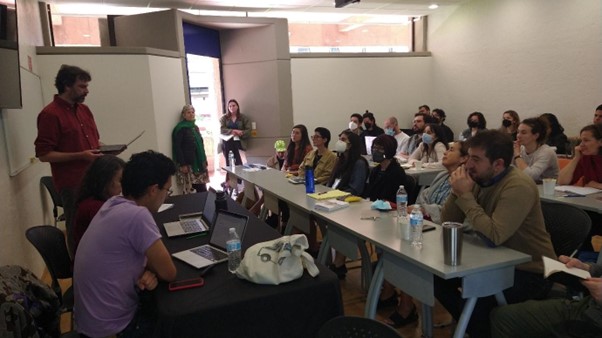
Participants of the 4S/ECOSITE panel, “Plantations and Epistemic Imperialism.” Cholula, Mexico, December 2022 [Image credit: Sophie Chao]
Scale, space, and subjecthood
These questions lay at the heart of a three-part panel on “Plantations and epistemic imperialism” held at the 4S/ECOSITE conference in Cholula, Mexico, in December 2022, and published in revised form in January 2024 as a collection of essays in radical geography journal Antipode’s Intervention series. Titled “Plantation Methodologies: Questioning Space, Scale, and Subjecthood,” the twelve contributions to this collection examine plantation systems past and present across Asia, Oceania, Latin America, the United States, the Caribbean, and Europe. Connecting these diverse geographic realms are the optics of scale, space, and subjecthood, that act as key methodological orientations in grappling with plantations’ situated social, political, ecological, economic, and ideological manifestations and impacts.
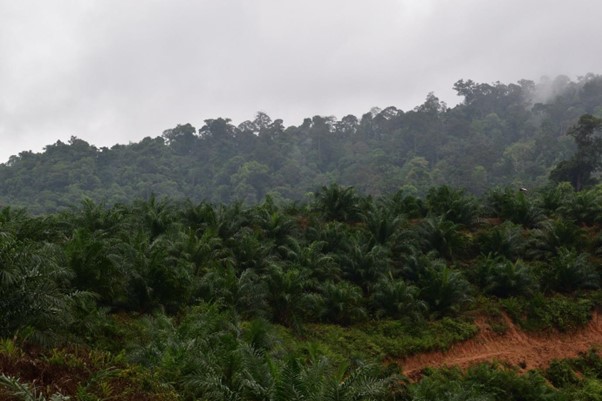
Alice Rudge examines the affects of nostalgia and longing generated by oil palm plantation frontiers among the Batek people of Peninsular Malaysia. [Image credit: Alice Rudge]
Subjecthood brings the authors to consider the lingering affects of loss, regret, and longing that haunt both plantation dwellers and those conducting research in monocrops as spaces of disfigurement and ruin. Thinking across sites and subjects brings to the fore humans’ fraught entanglements with non-human beings like plants who carve out a precarious existence on plantation frontiers, insects who thrive amidst projects for ‘green growth,’ or cash crops whose lifeways are sustained through relations with different positioned humans across time and space.
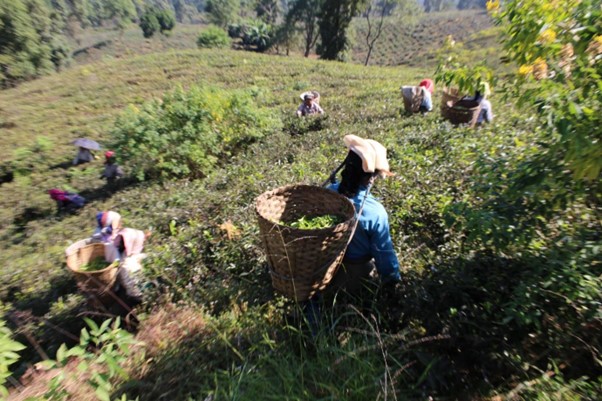
Desirée Kumpf considers the gendered forms of labor produced by ‘green growth’ regimes and attendant forms of multispecies care in Indian tea plantations [Image credit: Desirée Kumpf]
Putting subjecthood, scale, and subjects in a transhistorical, comparative perspective sheds light in other essays on the troubled legacies of agricultural revolutions, as these manifest in ongoing violence, militarization, war, and enduring economic hegemonies. Such legacies are also at play in the technoscientific visions of recent sustainability initiatives that bear uncanny continuities with past colonial ideologies and orders.
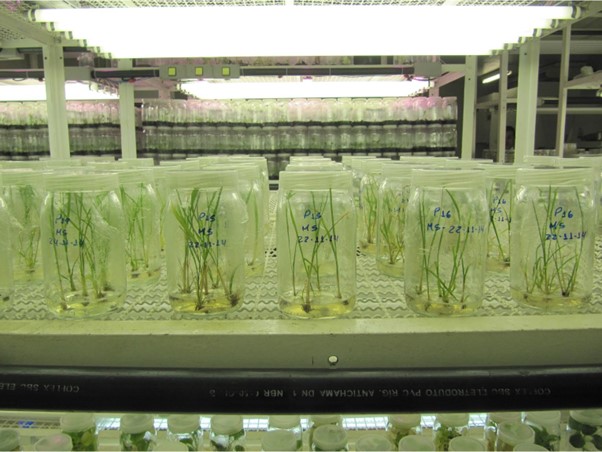
Nicole Labruto considers how uniform sugarcane plants modified by human technoscientific procedures in Brazilian labs produce crops for hyperefficient future monocrop fields, but also disrupt attempts at standardization. [Image credit: Nicole Labruto]
Other authors, meanwhile, turn their gaze to plantations’ afterlives in sites that no longer bear the visible form of the industrial field. These include urban cities like Singapore, where authoritarian politics echo plantation logics in their pursuit of control over both landscapes and subjects. They encompass the contemporary securityscapes of Jamaica, where contemporary housing infrastructures reinscribe plantation-borne distinctions of privilege and precarity. They include the ongoingly racialized and classist policing of life in post-empire societies – one that at times troublingly spills over into the realm of the ludic.

Kimberley D. McKinson examines how aspirational desires for a “house pon the hill” among Jamaica’s underclass and the country’s Black middle class unsettle the hill as a geography of colonial white surveillance and instead appropriate it as a geography of insurgent Black desire [Image credit: Kimberley D. McKinson]
Opening plantation conversations across space, time, and disciplines
Taken together, the collection opens fertile space for deeper conversations in science and technology studies and beyond on the promise and perils of plantations in the context of Anthropocenic processes and their unevenly distributed impacts on people and planet. In centering plantation methodologies, it offers a unique and experimental toolkit for scholars and students interested in researching plantations from a place of decolonial and coalitional thinking, relating, and acting. In doing so, the collection operates within, and furthers, the spirit of the 2022 4S/ECOSITE conference, that centered on possibilities for reunion, recuperation, and reconfiguration as we learn to live together in the ruins of capitalism and its multiple afterlives.

Cristiana Bastos and Deborah Heath deploy the lens of “plant-anthropo-genesis” to consider how humans and cash crops including pineapples, grapevines, tea, and sugar co-produce each other across space and time [Image credit: Cristiana Bastos]
The Antipode Intervention, “Plantation Methodologies: Questioning Space, Scale, and Subjecthood,” is available open-access at https://antipodeonline.org/2024/01/04/plantation-methodologies/. Edited by Alyssa Paredes, Sophie Chao, and Andrés León Araya, contributions from Kregg Hetherington, Alice Rudge, Desirée Kumpf, Andrés Caicedo, Diana Ojeda, María José Guillén-Araya, Andrés León Araya, Nicole Labruto, Stuart Earle Strange, Kimberley D. McKinson, Jolen Martinez, Cristiana Bastos, and Deborah Heath.
Sophie Chao is Lecturer in Anthropology at the University of Sydney. She is author of In the Shadow of the Palms: More-Than-Human Becomings in West Papua and co-editor of The Promise of Multispecies Justice (Duke University Press, 2022). Website: www.morethanhumanworlds.com.
Published: 01/31/2024
